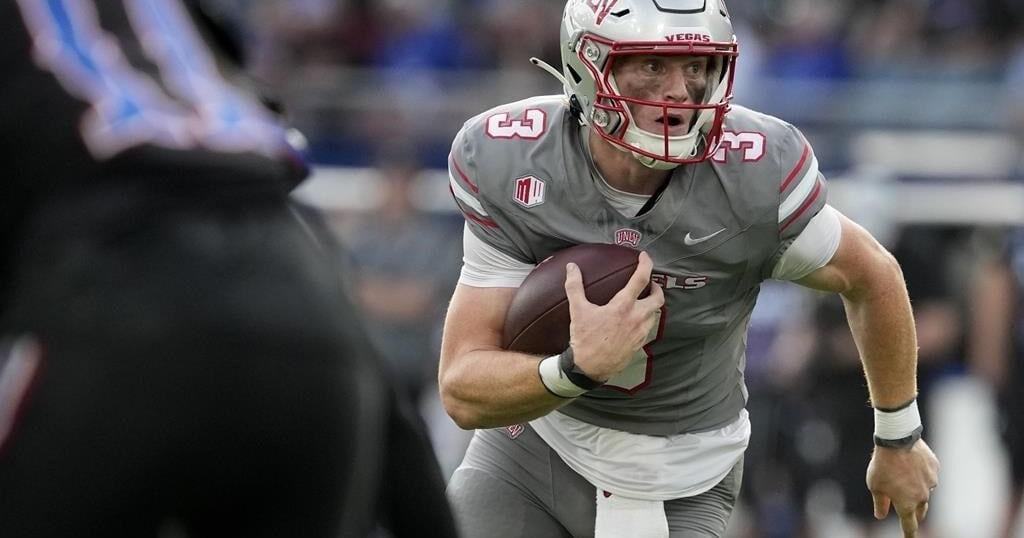LAS VEGAS – UNLV quarterback Matthew Sluka has decided to sit out the rest of his undefeated team’s season because of a dispute over a $100,000 NIL payment that was promised but never paid after he agreed to transfer to the Rebels last winter, Sluka’s agent told The Associated Press on Wednesday.
Sluka’s announcement in a social post Tuesday night sent shockwaves throughout major college football, where the old rules of amateurism have fallen but schools and the NCAA are still grappling with how to regulate the way players can be compensated for use of their name, image or likeness.
Sluka’s agent, Marcus Cromartie of Equity Sports, said Sluka was promised $100,000 by a UNLV assistant coach who recruited the quarterback last winter when he agreed to transfer from Holy Cross to the Rebels in January.
Because Sluka was still completing his degree at Holy Cross, he could not sign a NIL contract, typically done with booster-backed third parties called collectives that serve a school’s athletes — until after he enrolled at UNLV later in the year, Cromartie said.
Sluka did not join the team until preseason practice in August. No written contract was ever put in place, Cromartie said.
“In July, there was no NIL payments. There was no $100,000, I guess you could say zero dollars. He was given a $3,000 relocation fee and that was it,” said Cromartie, who declined to identify the assistant coach and said UNLV head coach Barry Odom was not involved in the initial discussions.
Cromartie said after several weeks went by he reached out to Odom and representatives of UNLV’s collective to discuss ways to pay Sluka the $100,000 he said the player was promised.
said he suggested payments of $10,000 a month over the next five months and even $5,000 per month and was declined. Cromartie said Sluka was offered $3,000 per month by Odom.
“At that point I think Matt felt lied to. At that point he just wanted to stand up for himself,” Cromartie said.
UNLV has not commented since Sluka’s announcement. UNLV is scheduled to host Fresno State (3-1) in a big Mountain West game on Saturday, with both schools hopeful of a strong season that could put them in the discussion for a spot in the 12-team College Football Playoff. The Rebels have already beaten two power conference schools.
NCAA redshirt rules allow players to retain a year of eligibility if they play four or fewer games in a season. Sluka, who played four seasons (2020-23) at Holy Cross, still has one more year of eligibility that he could use at another school next season.
NCAA rules do not allow players to play for two schools within the same season.
Sluka did not detail the reasons behind his decision, but college athletes are now routinely being paid millions by companies or the so-called collectives that focus on compensating a particular school’s athletes.
“I committed to UNLV based on certain representations that were made to me, which were not upheld after I enrolled,” Sluka posted on X. “Despite discussions, it became clear that these commitments would not be fulfilled in the future. I wish my teammates the best of luck this season and hope for the continued success of the program.”
The NCAA lifted its ban on athletes being compensated for things like endorsement and sponsorship deals in 2021, but put in place few detailed rules to regulate how athletes are paid beyond saying the compensation cannot come directly from the school.
A patchwork of state laws have created different standards around the country, and college sports leaders, including NCAA President Charlie Baker, have been lobbying Congress for a federal law to help get a handle of an unruly system that lacks transparency.
Georgia quarterback Jaden Rashada, who committed to play for Florida out of high school, is suing Gators coach Billy Napier and one of the school’s top boosters after a $14 million NIL deal fell through. Rashad never played for Florida. He was released from his scholarship agreement in 2023, transferred to Arizona State where he played last year and then transferred to Georgia this offseason.
UNLV went 9-5 last season and played for the Mountain West conference championship, but the quarterback who led that team to the program’s best season in nearly 40 years, Jayden Maiava, transferred to Southern California of the Big Ten.
Sluka was one of the top quarterbacks playing in Division I’s second tier, known as the Football Championship Subdivision. Holy Cross reached the FCS playoffs in 2021 and ’22 with Sluka as the starter.
After a coaching change at Holy Cross — head coach Bob Chesney left to take over at James Madison — Sluka also moved on. after setting a host of school records and rushing for an NCAA Division I quarterback record 330 yards in a loss to Lafayette in 2023.
Sluka has completed 21 of 48 passes for 318 yards, six touchdowns and one interception for the Rebels this season. A shifty and elusive runner, he has also rushed 39 times for 286 yards and a touchdown. He had 113 yards rushing in a 23-20 win over Kansas on Sept. 13 that followed an earlier win against Houston, making the Rebels 2-0 against Big 12 teams.
___
Get poll alerts and updates on the AP Top 25 throughout the season. Sign up here. AP college football: and College football ‘ Latest News & Updates
